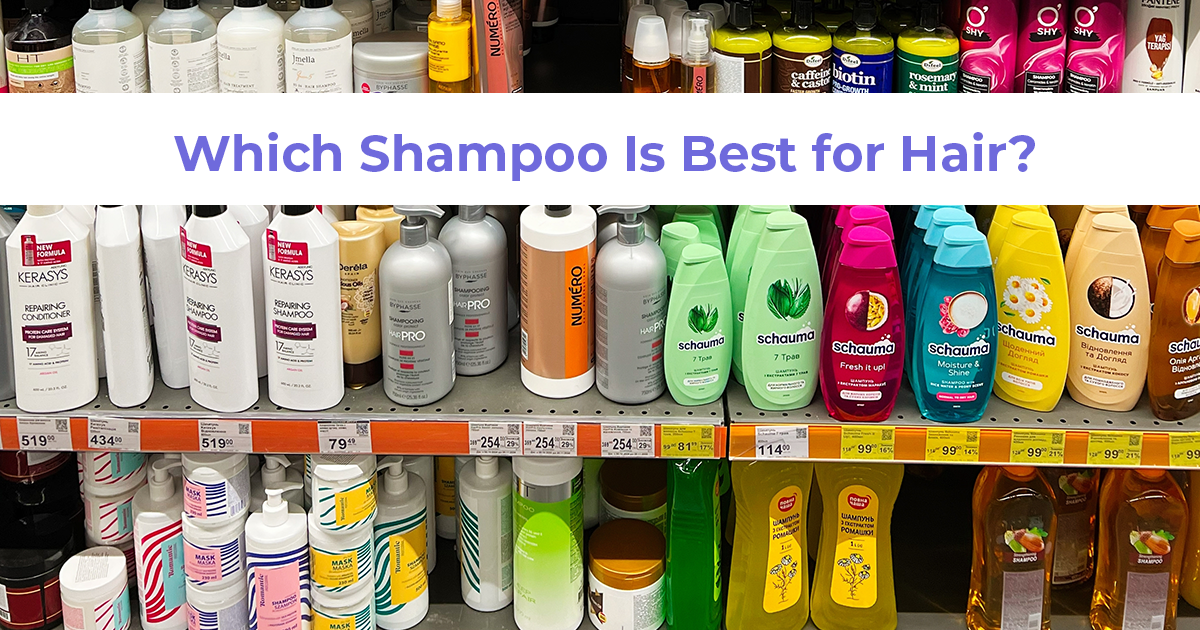
The $36 billion shampoo industry is booming and growing for a reason! 1 Today, shampoo is no longer a daily essential, but a powerful product that directly impacts scalp health, hair health and your overall appearance.
However, with numerous options available, many are left wondering which shampoo is best for their hair. From ‘sulfate-free’ to ‘anti-hair fall,’ the labels can be overwhelming. The truth is, the right shampoo depends on your hair type, scalp condition, and specific hair goals. Here’s a science-backed guide that educates you on identifying your individual hair type, understanding product labels and ingredients and then concluding on which shampoo is best for hair.
Key Takeaways
- Choosing the right shampoo depends on your scalp type, hair type, and goals, not trends or price.
- Shampoos matter because their ingredients affect scalp balance, hydration, breakage, and overall hair health.
- Know your scalp type (oily, dry, dandruff-prone) to select suitable cleansers and actives.
- Match your hair type (curly, fine, colour-treated, etc.) to the right formula for best results.
- Read product labels — check surfactants, conditioning agents, proteins, and avoid harsh irritants.
- Pick shampoos based on specific concerns like hair fall, dandruff, or colour protection.
- The right shampoo improves hydration, reduces frizz, supports healthy growth, and tackles targeted issues.
- Shampoo cleans, conditioner moisturises — using both keeps hair healthy and manageable.
- Wash 2–3 times a week with proper technique for best results.
Why Your Shampoo Matters

The ingredients used in every shampoo differ, and so do your scalp and hair needs. What ingredients may suit one person may not suit another.
Shampoos are not just about cleansing your hair and scalp. They are carefully curated formulas with specific ratios of different cleansers, conditioning agents, humectants and active ingredients, each playing a specific role. 2
While the main ingredient in every shampoo is a surfactant (the cleansing agent that removes oil, dirt and buildup from the scalp), the type and strength vary widely. For instance, sodium lauryl sulfate is a powerful surfactant that can strip away too much natural oil, leaving the hair brittle and scalp dry. Amphoteric agents offer gentle cleansing, better suited for sensitive or dry scalps. 2, 3
Apart from cleansers, shampoos also contain conditioning agents, botanical extracts, etc., to nourish the scalp and protect hair fibres. For instance, humectants like glycerin draw moisture into the hair, while hydrolysed proteins help strengthen the hair cuticle and reduce breakage. 4,5
As every scalp has unique needs, using a shampoo that does not align with these specific requirements, such as one with a high pH, may lead to dryness, irritation, or increased hair shedding.6 That is why understanding what is inside your shampoo should be your first step before choosing a formula.
First, Identify Your Hair Type & Scalp Condition
Did you know everyone’s scalp type is unique? A shampoo’s primary job is to cleanse the scalp and remove excess sebum, sweat, dirt and product buildup. But as scalps can be of different kinds, everyone requires different types of cleansers. Here are the common scalp types explained:
- Oily Scalp: An oily scalp tends to produce more sebum and gets oily within a day or two post-wash. 7 Look for gentle cleansing agents - amphoteric agents with ingredients like cocamidopropyl betaine and sodium lauraminopropionate, to cleanse an oily scalp.3 Avoid heavy conditioning shampoos that may make your scalp greasy very quickly.
- Dry or Sensitive Scalp: Dry scalp is a condition when the scalp loses too much moisture due to harsh products, dry weather, excessive washing or underlying conditions like eczema. 8 Go for moisturising ingredients like glycerin, panthenol or mild surfactants in your shampoo. 9
- Dandruff-Prone Scalp: A dandruff-prone scalp can be oily or dry. There is an abnormal shedding of skin cells, leading to flakes. 10 Medicated shampoos containing salicylic acid, ketoconazole or zinc pyrithione can help reduce fungal overgrowth and flaking. 11

Similarly, your hair type - curly, fine, coarse, straight, colour-treated- also calls for a specific shampoo formula. For instance, curly hair benefits from moisture-rich, sulfate-free shampoos that reduce frizz and preserve the curl patterns. 12
Understand Product Labels & Ingredients
Once you have figured out your scalp type, the next step is to figure out which shampoo is best for your hair. You will need to understand product labels and ingredients to determine if a particular shampoo is good for your hair type or not.
Here is what to look for:
1) Surfactants
Surfactants are cleansing agents. Harsh sulfates like sodium lauryl sulfate can strip moisture from hair strands, making hair dry and frizzy. The milder options, such as amphoteric surfactants, are gentler and more suitable for all hair types. 2,3
2) Conditioning Agents
Ingredients like silicones, certain oils or ammonium compounds improve softness and manageability of hair. Look for shampoos with these conditioning agents if you want moisturised and soft hair after every wash. 2
3) Active Botanicals & Proteins
Plant extracts, humectants, and hydrolysed proteins support scalp hydration and health. 4, 5
4) Irritant-Free Formula
Ensure your shampoo is free from alcohol-heavy formulas, artificial fragrances, and parabens that may trigger irritation in individuals with sensitive scalp conditions. 13, 14 Look for products labelled as ‘sulfate-free’, ‘pH-balanced’, and formulated with plant-based surfactants to ensure optimum hair and scalp health without chemicals.
Consider Additional Needs & Concerns
Beyond daily cleansing and hydration, shampoos can address certain hair concerns like breakage, hair fall or dandruff. If you are seeking a shampoo for any of these concerns, then you need to look for specific ingredients:
-
Hair Fall
If you are wondering which shampoo is best for hair fall, you need to look for shampoos containing caffeine, peptides, or niacinamide that may help to improve blood circulation and hair anchoring. 15, 16
-
Dandruff
If you are thinking which shampoo is good for dandruff, then you need to look for ingredients like zinc pyrithione or ketoconazole to reduce Malassezia fungi, which is responsible for dry flakes. 17
-
Colour Protection
Use low-sulfate or sulfate-free shampoo formulas to maintain the vibrancy of colour-treated hair. 18
Common Hair Concerns and Their Solutions
The common hair concerns can be addressed by certain key ingredients. Look for these ingredients in your shampoo formulas and use them regularly for best results:
|
Concern |
Key Ingredients to Look for |
Avoid |
|
Hair Fall |
Caffeine, niacinamide |
Harsh Sulfates |
|
Dandruff |
Zinc Pyrithione, Ketoconazole, Salicylic Acid |
Heavy Oils on Scalp |
|
Dryness |
Glycerin |
Alcohol-Heavy Formulas |
|
Oily Scalp |
Gentle Surfactants, Clarifying Ingredients |
Over-Conditioning |
Difference Between Shampoo and Conditioner
While shampoo gently cleanses the scalp and hair, a conditioner restores moisture, minimises frizz, smoothens the cuticle and improves hair manageability. 2 Using shampoo alone may leave your hair rough or prone to breakage. Using a conditioner alone may lead to product build-up on the scalp. Conditioners should always be used on clean hair and scalp. Pairing the right shampoo and conditioner helps maintain overall hair health. 19
How To Apply Shampoo (Step-by-Step)
Here is an easy step-by-step guide on how to apply shampoo:
- Wet Hair Thoroughly – Lukewarm water works best.
- Use a Small Amount – A coin-sized amount is often enough.
- Focus on Scalp – Gently massage the shampoo onto your scalp with your fingertips.
- Rinse Well – Ensure no residue remains.
- Follow with Conditioner – Apply mainly to lengths and ends.
Shampoo your hair twice a week or every other day for best results.
Conclusion
Choosing which shampoo is best for hair isn’t about picking a costly bottle, but understanding your scalp, hair type and specific needs. You need to look for pH-balanced, gentle and evidence-backed formulations that align with our personal hair goals, whether it is reducing dandruff, hair fall or frizz.
FAQs
Q1) How to know which shampoo is best for your hair?
Identify your hair texture, scalp type, and any specific hair concerns like hair fall, dandruff, or dry hair. Then look for ingredients that address these concerns.
Q2) How do I find the best shampoo and conditioner for my hair?
Read the labels carefully. Look for pH-balanced, dermatologically tested formulas with ingredients that suit your hair’s needs.
Q3) How to know if a shampoo and conditioner is good for your hair?
If your scalp feels balanced after using the shampoo and conditioner and doesn’t feel itchy, dry, or oily, then most likely you have chosen the right products.
Q4) Which is the No. 1 shampoo in India?
There is no single “No. 1” shampoo in India. The best shampoo depends on individual needs. Dermatologically tested and science-backed brands often deliver good results.







